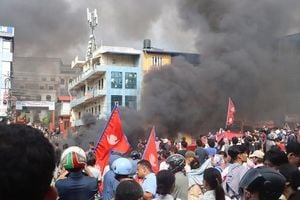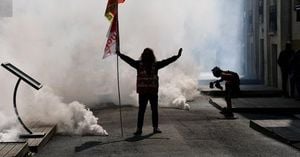On January 23, 2025, the vibrant yet perilous streets of Culiacán, Sinaloa, became the setting for yet another act of violence as renowned social media influencer Adalberto Peña Urquidez, widely known as "El Tata," was gunned down early Thursday morning. The incident, which drew numerous onlookers and concern from local residents, reflects the growing crisis of violence against influencers and public figures in Mexico.
It was just before 9:00 AM when Peña, 42, was exercising at the Plaza Vancouver located at the intersection of Boulevard Rotarismo and Amatista, when assailants approached and opened fire. Eyewitnesses reported hearing multiple gunshots, leading to immediate calls to emergency services. Local police arrived shortly after, but Peña was pronounced dead at the scene, suffering multiple gunshot wounds, as authorities cordoned off the area to assist forensic investigators.
This tragic loss marks Peña as the fifth influencer to be murdered amid the raging conflict among criminal factions, particularly the "Chapitos" and associates of notorious cartel leader Ismael "Mayo" Zambada. Criminal gangs have increasingly targeted individuals with public followings, merging the realms of social media fame and the harsh realities of cartel violence.
Prior to his untimely death, Peña had amassed over 171,000 followers on TikTok and more than 18,000 on Instagram, where he shared insights about his fitness routines and daily life alongside family and friends. His most recent social media posts express warmth and joy, with the last being a birthday greeting to fellow gym-goers just hours before the attack.
Family and friends have flooded social media with messages of sorrow and remembrance, with his wife sharing touching tributes. "Always in our hearts," read one of her messages, accompanied by heartfelt images of their times together.
The violence continues to raise alarm bells across the region, with the murder of Adal Peña entangled within wider patterns of aggressive confrontations between rival criminal groups. Earlier reports noted abominable events occurring almost simultaneously on the same day. Just hours before Peña's assassination, two municipal police officers were also ambushed and killed near Parque 87, underscoring the heightened danger faced not only by influencers but also by law enforcement personnel.
How did it reach this point? Sinaloa has been marked by turbulent power struggles among different criminal organizations. These groups are not only jostling for control over territory and drug routes but are also increasingly pulling ordinary citizens and public figures like Adal Peña unwittingly onto their battleground.
Peña's death is, unfortunately, part of this disturbing trend where social media personalities become collateral damage amid the fierce territorial wars of drug cartels. The very platforms through which they built their followings have sown the seeds of danger. With influencers like Peña targeted not only for their visibility but also for their potential ties to powerful criminal figures, the question looms: how can the state protect its cultural icons when the criminal underworld threatens all?
Local authorities have vowed to investigate the circumstances surrounding Adal Peña’s murder, yet with the pervasive shadows of crime looming over Sinaloa, many doubt swift justice will be served. Measures continue to be discussed about how best to shield influencers and their families from the torrent of violence threatening their lives and livelihoods.
The community's reaction is one of disbelief mixed with fear. Friends and supporters held vigils, lighting candles for their beloved influencer as news of his death spread. "El Tata" not only represented fitness but also the soul of his followers—encouraging them to live healthier, happier lives.
Adal Peña’s brutal murder paints the stark reality faced by influencers today—where being public figures can lead them straight to perilous encounters. Regrettably, the struggle to balance fame with safety appears more challenging than ever amid Mexico's deep-seated issues with drug-related violence.
This incident serves as both a tragic loss to the community and a potent reminder of the urgent need for protective measures for public figures. The echoes of gunfire on the streets of Culiacán are increasingly unsettling and serve as warnings about the unchecked violence plaguing the region.
Although Peña's online presence represented empowerment through fitness and family values, his life ended brutally, highlighting the troubling intertwining of fame and violence. Families are left mourning loved ones; communities are reeling, and influencers everywhere are reconsidering their safety.
With each violent act contributing to the growing fear, Sinaloa teeters on the brink, caught between the allure of social media fame and the scourge of violence.



